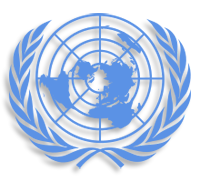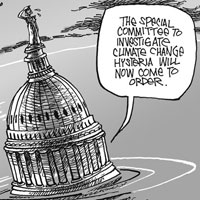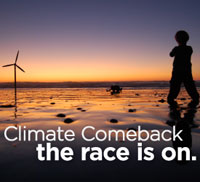|
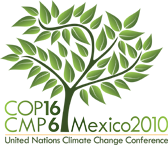 The United Nations Climate Change Conference to be held in Cancun, Mexico, from 29 November to 10 December 2010, includes the sixteenth Conference of the Parties (COP) and the sixth Conference of the Parties serving as the meeting of the Parties to the Kyoto Protocol (CMP). The thirty-third sessions of both the Subsidiary Body for Implementation (SBI) and the Subsidiary Body for Scientific and Technological Advice (SBSTA), and the fifteenth session of the AWG-KP and thirteenth session of the AWG-LCA also will meet in Cancun. The United Nations Climate Change Conference to be held in Cancun, Mexico, from 29 November to 10 December 2010, includes the sixteenth Conference of the Parties (COP) and the sixth Conference of the Parties serving as the meeting of the Parties to the Kyoto Protocol (CMP). The thirty-third sessions of both the Subsidiary Body for Implementation (SBI) and the Subsidiary Body for Scientific and Technological Advice (SBSTA), and the fifteenth session of the AWG-KP and thirteenth session of the AWG-LCA also will meet in Cancun.
To discuss future commitments for industrialized countries under the Kyoto Protocol, the Conference of the Parties, serving as the Meeting of the Parties to the Kyoto Protocol (CMP), established a working group in December 2005 called the Ad Hoc Working Group on Further Commitments for Annex I Parties under the Kyoto Protocol (AWG-KP). In Copenhagen, at its fifth session, the CMP requested the AWG-KP to deliver the results of its work for adoption by CMP 6 in Cancun.
View recommended links
View highlights from the first week
View highlights from the second week
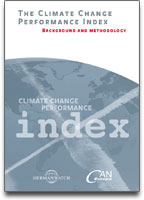 In December 2010 Germanwatch and Climate Action Network (CAN) Europe released the sixth annual Climate Change Performance Index (CCPI), which evaluates and ranks the 57 highest-emitting countries based on their emissions and climate policies. Canada placed 54th out of 57 countries, ahead of only Australia, Kazakhstan and Saudi Arabia. The survey consults 190 climate experts around the world and considers an analysis of national priorities, the strength of countries climate policies, and how well that country controls greenhouse gas emissions.
In December 2010 Germanwatch and Climate Action Network (CAN) Europe released the sixth annual Climate Change Performance Index (CCPI), which evaluates and ranks the 57 highest-emitting countries based on their emissions and climate policies. Canada placed 54th out of 57 countries, ahead of only Australia, Kazakhstan and Saudi Arabia. The survey consults 190 climate experts around the world and considers an analysis of national priorities, the strength of countries climate policies, and how well that country controls greenhouse gas emissions.
It's the sixth year in a row Canada has been judged an international laggard, and placed near the bottom of the CCPI. For the 2010 report, Canada ranked 56th out of 57 countries evaluated.
"Although Canada scored poorly across the board, its national policies were its greatest source of weakness. Sadly, that's not a surprise, as the federal government has failed to put in place the key policies needed to cut Canada's greenhouse gas pollution. It's worth noting that Norway — like Canada, a cold country that exports oil and gas — finished third overall, earning a high score on climate policy," stated Matthew Bramley, Director of the Pembina Institute's climate change program.
View December 6, 2010 Gemanwatch, Climate Change Performance Index 2011
View December 6, 2010 CBC article
View December 6, 2010 Winnipeg Free Press (online) article
View December 6, 2010 660 AM News (Calgary) article
View December 6, 2010 Straight.com article
View December 8, 2010 Troy Media article
Source: Germanwatch, CBC
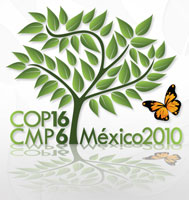 "Confidence is back. Hope has returned!" exclaimed Mexican President Felipe Calderon at the conclusion of the Cancún Climate Conference. Delegates meeting at the 16th Conference of the Parties to the UN Framework Convention on Climate Change (UNFCC), representing 193 countries, overcame deep suspicion and geopolitical rivalries, approving the Cancún Agreements which commit countries to increase their effort to battle climate change and preserves key principles of the Kyoto Protocol. "With this agreement, we have broken out of the inertia and feeling of hopelessness," added Calderon.
"Confidence is back. Hope has returned!" exclaimed Mexican President Felipe Calderon at the conclusion of the Cancún Climate Conference. Delegates meeting at the 16th Conference of the Parties to the UN Framework Convention on Climate Change (UNFCC), representing 193 countries, overcame deep suspicion and geopolitical rivalries, approving the Cancún Agreements which commit countries to increase their effort to battle climate change and preserves key principles of the Kyoto Protocol. "With this agreement, we have broken out of the inertia and feeling of hopelessness," added Calderon.
"We are much further than we thought we would be before coming to Cancún," said Wendy Trio, climate policy director for Greenpeace.
Mexican Foreign Minister Patricia Espinosa was widely credited for her deft and transparent management of the intricate and often-heated negotiations. She avoided the mistake of last year's Copenhagen meeting -- where major countries crafted a deal behind closed doors that was later rejected by the convention as a whole -- while still managing to keep negotiations on track.
Achievements of the climate conference include:
- Reducing Emissions from Deforestation and Degradation - an agreement that could play a role in helping prevent deforestation of developing nations by paying poorer nations to stop cutting down forests;
- Establishment of a fund that will raise and disburse $100bn a year by 2020 to protect poor nations against climate impacts by assisting with low-carbon development.
- Mechanism to transfer low-carbon technologies to developing countries.
- Developing countries will have their emission-curbing measures subjected to international verification - when they have received the funds they have been promised by the west.
Chief U.S. negotiator Todd Stern said the deal "while not perfect, is certainly a good basis for moving forward, putting the world on a more hopeful path toward a low-emissions and sustainable future."
"Today's result chases away many of the ghosts of Copenhagen. Although the result is very far from perfect, the Cancun climate talks took real steps forward, including establishing a new global climate fund. Unfortunately Canada was singled out as a laggard among its peer countries, particularly on the question of the second phase of Kyoto," said Pembina Institute Policy Analyst Clare Demerse.
After tallying up 6 Fossil of the Day awards over the course of the Cancún climate talks, Canada was dishonored with the Colossal Fossil of the Year award for the fourth year in a row. The Fossil awards are voted on by over 500 leading international organizations to the country who has done the most to disrupt or undermine the UN climate talks. Canada is a signatory to the Kyoto Protocol, but the Canadian government backed out of Kyoto in 2006, and refused to commit to a second reporting period under Kyoto at Cancún.
The next Conference of the Parties to the UNFCCC is scheduled for Durban South Africa from 28 November to 9 December 2011.
View Cancún Agreements on UNFCC webpage
View December 11, 2010 The Globe and Mail article
View December 11, 2010 United Nations press release
View December 11, 2010 Climate Action Network release
View December 12, 2010 Guardian article
View December 12, 2010 CTV News article
View December 13, 2010 Vancouver Sun article
View December 13, 2010 New York Times article
View December 13, 2010 ABC News article
Source: United Nations, The Globe and Mail, Climate Action Network
Manitoba Wildlands will be providing selected and recommended links for news, reports, and analysis regarding the UN Cancún Climate Summit December 2010. Media releases and clips will be listed by: Pre-Conference, During-Conference, and Post-Conference. Sub pages will appear below.
Websites:
Blogs:
Events:
Reports:
Photos:
Videos/Podcasts: 
- U.N. Guards Beat Reuters Photographer at Cancún Climate Talks
- December 18, 2009 Fossil of the Year Award, YouTube
- December 11, 2010 Response to COP16 Outcome/Ambassador Luis Alfonso de Alba, OneWorldTV
- December 10, 2010 Tim Gore of OXFAM on the final day of the UNFCCC COP16 Climate Talks, OneWorldTV
- CYD Copengen on Citizen Shift
- Green Party Videos
- December 9, 2010 Canadians united, YouTube
- December 4, 2010 LULUCF Loophole Video, Youth Climate
- OneClimate live from the UNFCCC
- December 1, 2010 APTN Interview with Clayton Thomas-Mueller From COP 16 in Cancun
- November 30, 2010 OneClimate interviews Mediators Beyond Borders at COP16 in Cancun, Mexico
- Rabble.ca Podcasts
- November 30, 2010 Minister Baird, the worst in Canada's history.mov, Équiterre
- November 30, 2010 Steven Guilbeault presents expectations for Cancun.mov, Équiterre
- December 18, 2010 Obama Copenhagen December 2009 speech, The Globe and Mail
- Gracias Por Nada
Media Releases - Post-Conference:
- UN process saved, but climate conference fails to save the planet, The Malta Business Weekly
- December 17, 2010 Filtering out the climate-change BS, The Globe and Mail
- December 20, 2010 Christiana Figueres: Countries Need To Deepen Commitments To Cutting CO2 Emissions, Huffington Post
- December 11, 2010 Cancun Climate Agreement Raises Temperature on Harper, Wilderness Committee
- December 10, 2010 EU and US Should 'Offer More' on Climate Protection, Spiegel Online
- December 13, 2010 Unions hail climate deal but demand more next time, National Union of Public and General Employees
- December 12, 2010 Canada's climate credibility needs work: Analysis, Toronto Star
- December 11, 2010 Leading experts respond to outcome of UN climate talks in Cancun, Climate Action Network Canada
- December 11, 2010 Global accord on climate change hailed as breakthrough, The Globe and Mail
- December 12, 2010 A muted cheer for the Cancún agreement, guardian.co.uk
- December 11, 2010 Climate draft text signals breakthroughs, The Globe and Mail
- December 11, 2010 The Cancun Compacts: Nations Of World Choose Hope In Face Of Climate Crisis, The Wonk Room
- December 11, 2010 Global accord on climate change hailed as breakthrough, The Globe and Mail
- Canadian Youth Delegation Wrap Up - Cancun
- December 11, 2010 Leading experts respond to outcome of UN climate talks in Cancun, Climate Action Network Canada
- December 11, 2010 UN Climate Change Conference in Cancún delivers balanced package of decisions, restores faith in multilateral process, United Nations Framework Convention on Climate Change (PDF)
- December 11, 2010 Climate-change reputation in tatters? Try blustering, The Globe and Mail
Media Releases - Week 2:
- December 10, 2010 Climate Talks Briefing Update - Webcast from Cancún, Climate Action Network International
- December 10, 2010 Can't'nada wins fourth straight Colossal Fossil award, Climate Action Network Canada
- December 9, 2010 Canada wins a first place fossil of the day for caring more about the oil in the tank of the car than the passengers, Climate Action Network Canada
- December 7, 2010 UN Implores Private Sector to Help in Climate Change Fight, ClimateBiz
- December 7, 2010 UN Expert Urges Firms to Tackle Climate Issues in Supply Chains, GreenBiz
- December 7, 2010 Cancún summit: Rich countries accused over £30bn climate aid promise, guardian.co.uk
- December 8, 2010 Baird comes out swinging at China at Cancun climate talks, The Globe and Mail
- December 6, 2010 Building Blocks for a Climate Agreement, The Huffington Post
- December 11, 2010 US-China truce signals a spirit of compromise in Cancun climate talks, DW-World.de
- December 8, 2010 Commitment problems, Ottawa Citizen
- December 8, 2010 Canadian oil companies under fire at UN conference, Vancouver Sun
- December 4, 2010 China Seeks Climate Compromise on 'Disastrous' Debate to Extend Kyoto, Bloomberg
- December 7, 2010 Minister Baird's coal confusion, Climate Action Network Canada
- December 6, 2010 China world's best hope, worst fear regarding climate crisis, The Globe and Mail
- December 6, 2010 Message from the north: It is past time for a public debate on tar sands and climate, NRDC Switchboard
- December 6, 2010 Alberta environment minister not surprised at ad mocking him over oilsands, Winnipeg Free Press
- December 6, 2010 Nature talks see mood of compromise emerge, BBC News
- December 6, 2010 In Mexico City, a Message for Cancún, Common Dreams
- December 6, 2010 Why Canada is still at the back of the pack on climate, Pembina Institute
Media Releases - Week 1:
- December 1, 2010 Why Agreement on Climate Finance is Critical to COP16's Success, ClimateBiz
- December 3, 2010 Government accused of glacial response as UK counts cost of big freeze, The Independent
- December 1, 2010 Cancún climate talks are vital to the UK, guardian.co.uk
- December 2, 2010 Japan derails climate talks by refusing to renew Kyoto treaty, The Independent
- November 29, 2010 Climate change scientists warn of 4C global temperature rise, guardian.co.uk
- November 29, 2010 Crop failures and drought within our children's lifetimes, The Independent
- November 30, 2010 Shell files for carbon capture in Alberta oil sands, Reuters
- December 1, 2010 Don't consign us to history, plead island states at Cancún, guardian.co.uk
- December 1, 2010 Rising sea level threatens 'hundreds' of Caribbean resorts, says UN report, The Independent
- December 4, 2010 US Plays the Big Tease at Global Climate Talks, Huffington Post
- December 4, 2010 350: Signs of a movement at COP16, TckTckTck
- December 4, 2010 Rejecting Kyoto extension threatens climate talks: developing nations, The Globe and Mail
- December 4, 2010 Canada joins Russia, Japan in opposition to extending Kyoto Protocol, Toronto Star
- December 4, 2010 Canada tearing 'the heart' out of Kyoto accord: environmentalists, Montreal Gazette
- December 3, 2010 Maude Barlow: Read Me My Environmental Rights, Yes! Magazine
- December 3, 2010 A grim picture emerges in Cancun, Rabble.ca
- December 3, 2010 Youthful optimism in Cancun, The Pembina Institute
- December 2, 2010 In Mexico City, a Message for Cancún, Yes! Magazine
- December 3, 2010 WikiLeaks cables reveal how US manipulated climate accord, guardian.co.uk
- December 3, 2010 Cancún Climate Change Summit: Protect Our Forests to Protect People Too, Common Dreams
- December 2, 2010 U.S. to regulate big polluters, leaving no excuses for Canada's inaction, The Pembina Institute
- December 1, 2010 Negotiating in bad faith, Embassy
- The Heat is on the CDM in Cancun, International Rivers
- November 29, 2010 What to expect (or not) from the Cancun climate talks, Grist
- November 29, 2010 Beware of drug pushers in Cancun, Grist
- Canada sweeps Fossil of the Day awards in Cancun, National Union of Public and General Employees
- November 30, 2010 Felipe Calderon, Mexican President, Hopes U.S. Republicans Change On Climate, Huffington Post
- November 29, 2010 'Pyramid of Hope' built in Cancun, Mother Nature Network
- November 29, 2010 Oil Companies and Banks Will Profit From UN Forest Protection Scheme, Common Dreams
- November 29, 2010 Understanding the Canadian Youth Delegation's Policy Position, Canadian Youth Delegation
- November 29, 2010 Cancún climate summit - opening day live coverage, guardian.co.uk
- November 29, 2010 Opinion Survey on Cancun Climate Talks: Key Findings, Think to Sustain
Media Releases - Pre-Conference:
- November 27, 2010 Cancún climate talks: what you need to know, New Scientist
- November 25, 2010 Political inaction on climate change frustrate young people ahead of UN summit, Winnipeg Free Press
- November 24, 2010 Canadian envoy questions UN climate process, The Globe and Mail
- November 27, 2010 Acclimatizing for a Climate Conference, Northern News Services Online
- November 28, 2010 Bolivia: Cancún Should Not Be Copenhagen Accord Part II, Indigenous Peoples Issues & Resources
- November 28, 2010 Canada to match U.S. emissions standards, The Globe and Mail
- November 26, 2010 People's Assemblies and Climate Justice Are the UN climate talks the only way?, Canadian Youth Delegation
- November 26, 2010 Cancun climate summit: Rich accused of 'holding humanity hostage', guardian.co.uk
- November 26, 2010 World is warming quicker than thought in past decade, says Met Office, guardian.co.uk
- November 28, 2010 Climate change will cost a billion people their homes, says report, guardian.co.uk
- November 8, 2010 Climate finance plan could break talks inertia, guardian.co.uk
- November 26, 2010 A waste of time in Cancun?, CBC News
- November 26, 2010 Youth Activists Plan Co-Operation Over Protest at Cancún Climate Summit, Common Dreams
- November 25, 2010 Forest and Indigenous Groups Reject Cancún Forest Deal
REDD Will Violate Rights, Accelerate Emissions, Groups Warn, Red Road Cancun
- November 26, 2010 Move ball forward at Cancun climate talks, CNN
- November 24, 2010 Greenhouse gases at record levels: UN agency, Reuters
- November 25, 2010 Most wanted list of climate change culprits rewritten, New Scientist
- November 25, 2010 Small islands seek 2011 deadline for climate deal, Reuters
- November 8, 2010 Climate finance plan could break talks inertia, guardian.co.uk
- November 24, 2010 UN Secretary-General Discusses Areas for Agreement, Climate-L
- November 24, 2010 10 questions Cancun must answer, businessGreen
- November 24, 2010 Canadian climate envoy calls UN process into question ahead of Cancun summit, Macleans
- November 23, 2010 Feds go into climate talks with little to offer, Toronto Sun
- November 22, 2010 Activist occupy oil rig in the Gulf of Mexico, Greenpeace
Quebec Premier Receives Australian Award
Quebec's Premier Jean Charest was given the South Australian International Climate Change Leadership Award in Cancun. Australia hands out the award every year to recognize a political leader for their contribution to stopping climate change.
Read on...
Alberta environment minister defends oilsands before Europeans
Alberta Environment Minister Rob Renner defended the oilsands by meeting with influential officials from the European Parliament who have criticized impact of the oilsands at climate talks in Cancun.
Read on...
Cancun Talks Hears Canada's Message
Canada's Environment Minister, John Baird, spoke to international climate change negotiations in Cancun, Mexico, Tuesday December 7. Baird said he wants a new, international binding agreement that will see emissions stabilize and then decline, but he wants it to apply to all nations equally, even developing nations. Less developed countries such as China, South Africa, India and Brazil were not required to limit their emissions under the Kyoto protocol.
Read on...
Minister Baird's Coal Confusion
Environment Minister John Baird arrived in Cancun confused about what exactly Canada is and is not doing to combat global warming. Leading organizations across the country are calling on Minister Baird and the Canadian government to come clean on misleading claims that Canada has banned coal-fired electricity generation.
Read on...
Cancun Climate Conference: Fears Over Global Deal On Forests
A global deal to save rainforests, backed by the Prince of Wales, hung in the balance at the Cancun climate change talks as countries struggle to agree on how to stop deforestation.
Read on...
China Says Can Make Carbon Cuts "Binding"
China is willing to make its voluntary carbon emissions target part of a binding U.N. resolution. This concession may pressure developed countries to extend the Kyoto Protocol.
Read on...
China, India, Brazil Push U.S. for Deeper Greenhouse Gas Cuts
China, India, Brazil and South Africa said the U.S. must pledge deeper cuts in greenhouse gas emissions to help make progress in United Nations climate talks.
Read on...
Pembina Reacts: Canada Again Ranks Near Last in Global Climate Change Performance Index
Canada continued a troubling tradition, once again finishing near the bottom of the Climate Change Performance Index, an evaluation of countries' success in tackling climate change. Just three countries of the 57 evaluated fared worse: Australia, Kazakhstan, and Saudi Arabia.
Read on...
Saudi Arabia Earns 1st Place Fossil Of The Day For Trying To Silence Civil Society
Saudi Arabia earned the 1st place Fossil of the Day for trying to limit civil society's participation and voice in the negotiations. This is Saudi Arabia's second Fossil at the Cancun negotiations.
Read on...
Climate Action Network Canada response to Executive Secretary's comments on Canada and the continuation of the Kyoto Protocol
The Executive Secretary's identified Canada as one of the very few countries that will not commit to a second commitment period of the Kyoto Protocol.
Read on...
2010 Set To Be Canada's Warmest Year Yet
The year 2010 is expected to be one of the three warmest years worldwide since the collection of reliable climate data began - and Canada's on track to record its hottest year yet. Data released by the UN's weather agency, the World Meteorological Organization, provides further evidence of a warming trend due to the rise in man-made greenhouse gases. During the first 10 months of 2010, the global combined sea surface and land surface air temperature was 0.55 degrees C above the 1961-1990 annual average of 14 degrees C.
Read on..
Summary of Developed Countries Fast Start Climate Finance Pledges
World Resources Institute (WRI) carried out a preliminary analysis based on available information on countries' immediate pledges announced thus far in Cancun. The accompanying table sets out both the amounts and the mechanisms by which funding would be delivered. WRI has also looked at whether these pledges will provide "new and additional" funds compared to existing official development assistance.
Read on...
Summary of UNFCC Submissions
Summary of Country submissions April 2010 through November 2010 in the lead up to the 2010 Cancun negotiations. Tables summarize various aspects of Party submissions and categorize them into main sections.
Read on...
Over a Dozen Countries Share Fossil Awards for Carbon Capture & Storage "Hot Air" - Climate Action Network-International
From Norway to New Zealand and Algeria to Australia, thirteen countries shared the "prize" of two Fossils of the Day for promoting carbon capture and storage in the Clean Development Mechanism, and trying to preserve the "hot air" of surplus Assigned Amount Units in future commitment periods of the Kyoto Protocol.
Read on...
Thousands in Mexico Rally as Cancun negotiations begin - Reuters (Video 1:56)
As the U.N.'s climate change conference kicks off in Cancun thousands of environmentalists rally in Mexico City hoping these talks will lead to an agreement.
Read on...
Japan Wins 1st (and Only) Place Fossil of the Day for Trying to Kill Kyoto Protocol - Climate Action Network-International
Japan received the dubious distinction of being the only government to win a Fossil of the Day award November 30 for its efforts to prevent the continuation of a protocol to the United Nations climate convention that was agreed to in its own city of Kyoto.
Read on...
Canadian Youth Delegation in Cancun hosts peaceful sit-in to solve accreditation issues - Canadian Youth Delegation Wordpress
The Canadian Youth Delegation (CYD) staged a peaceful sit-in at Hostel Moloch thanks to accreditation issues that kept the CYD out of the climate negotiations. The sit-in began on November 28 when delegates learned a glitch in the UNFCCC system was preventing the CYD from accessing accreditation badges.
Canada: Once, Twice, Three times a Dinosaur! - Climate Action Network-International
The Canadian government, led by returned Environment Minister John Baird, kicked off United Nations (UN) climate talks in Cancun, Mexico, by winning three Fossil of the Day awards - first, second and third place simultaneously!
Read on...
Canada won't follow U.S. plan to cut greenhouse gases: Baird - CP
The Harper government has no plans to follow a U.S. initiative to slash greenhouse gas emissions of big polluters - even though Ottawa had pledged to harmonize its climate policies with the Americans.
Read on...
Climate deal not expected at Cancun says Canada's lead Negotiator - CBC
This year's UN climate change conference in Cancun, Mexico, is unlikely to yield a deal that will replace the Kyoto Protocol, which expires in 2012, says Canada's negotiator Guy Saint-Jacques.
Read on...
Lead Canadian negotiator in Cancun calls entire UNFCCC process into question - Globe and Mail
Canada's chief negotiator, Guy Saint-Jacques, questions whether the United Nations Framework Convention on Climate Change (UNFCC) is the best forum for climate negotiations, and downplays possibility of success in Cancun.
Read on...
Documents show Canadian collusion with oil companies to kill U.S. and E.U. climate legislation - Climate Action Network-Canada
Government letters, memos, speeches, and lobbyist reports assembled through freedom of information requests by Pembina Institute, Natural Resources Defence Council, and Climate Action Network-Canada point to a coordinated lobbying strategy to kill climate change policies in other countries.
Read on...
 In a September 6, 2010 address to the Technológico de Monterrey, a Mexican private educational institution, Canadian MP and former Liberal Leader Stéphane Dion outlined the challenges on the road towards COP 16 in Cancún, Mexico, November 29-December 10 2010. In a September 6, 2010 address to the Technológico de Monterrey, a Mexican private educational institution, Canadian MP and former Liberal Leader Stéphane Dion outlined the challenges on the road towards COP 16 in Cancún, Mexico, November 29-December 10 2010.
COP 16, or the 16th Conference of the Parties to the United Nations Framework Convention on Climate Change (UNFCC) and 6th Session of the Meeting of the Parties to the Kyoto Protocol, will continue negotiations from the 2009 Copenhagen sessions, including to have a binding international agreement in place before the Kyoto Protocol expires in 2012.
 Download September 6, 2010 Notes for an address by the Honourable Stéphane Dion (DOC) Download September 6, 2010 Notes for an address by the Honourable Stéphane Dion (DOC)
|

 In a September 6, 2010 address to the Technológico de Monterrey, a Mexican private educational institution, Canadian MP and former Liberal Leader Stéphane Dion outlined the challenges on the road towards COP 16 in Cancún, Mexico, November 29-December 10 2010.
In a September 6, 2010 address to the Technológico de Monterrey, a Mexican private educational institution, Canadian MP and former Liberal Leader Stéphane Dion outlined the challenges on the road towards COP 16 in Cancún, Mexico, November 29-December 10 2010. Download September 6, 2010 Notes for an address by the Honourable Stéphane Dion (DOC)
Download September 6, 2010 Notes for an address by the Honourable Stéphane Dion (DOC) 2002-2014
2002-2014


 In December 2010 Germanwatch and Climate Action Network (CAN) Europe released the sixth annual Climate Change Performance Index (CCPI), which evaluates and ranks the 57 highest-emitting countries based on their emissions and climate policies. Canada placed 54th out of 57 countries, ahead of only Australia, Kazakhstan and Saudi Arabia. The survey consults 190 climate experts around the world and considers an analysis of national priorities, the strength of countries climate policies, and how well that country controls greenhouse gas emissions.
In December 2010 Germanwatch and Climate Action Network (CAN) Europe released the sixth annual Climate Change Performance Index (CCPI), which evaluates and ranks the 57 highest-emitting countries based on their emissions and climate policies. Canada placed 54th out of 57 countries, ahead of only Australia, Kazakhstan and Saudi Arabia. The survey consults 190 climate experts around the world and considers an analysis of national priorities, the strength of countries climate policies, and how well that country controls greenhouse gas emissions. "Confidence is back. Hope has returned!" exclaimed Mexican President Felipe Calderon at the conclusion of the Cancún Climate Conference. Delegates meeting at the 16th Conference of the Parties to the UN Framework Convention on Climate Change (UNFCC), representing 193 countries, overcame deep suspicion and geopolitical rivalries, approving the Cancún Agreements which commit countries to increase their effort to battle climate change and preserves key principles of the Kyoto Protocol. "With this agreement, we have broken out of the inertia and feeling of hopelessness," added Calderon.
"Confidence is back. Hope has returned!" exclaimed Mexican President Felipe Calderon at the conclusion of the Cancún Climate Conference. Delegates meeting at the 16th Conference of the Parties to the UN Framework Convention on Climate Change (UNFCC), representing 193 countries, overcame deep suspicion and geopolitical rivalries, approving the Cancún Agreements which commit countries to increase their effort to battle climate change and preserves key principles of the Kyoto Protocol. "With this agreement, we have broken out of the inertia and feeling of hopelessness," added Calderon.